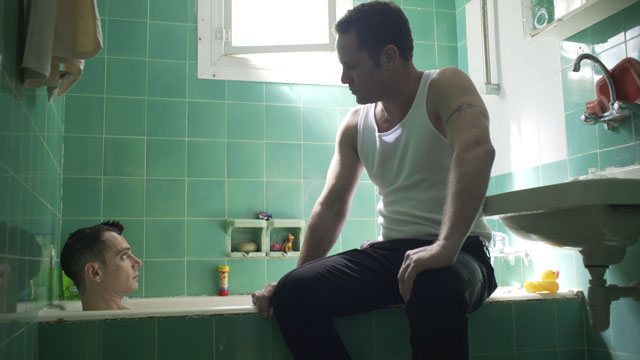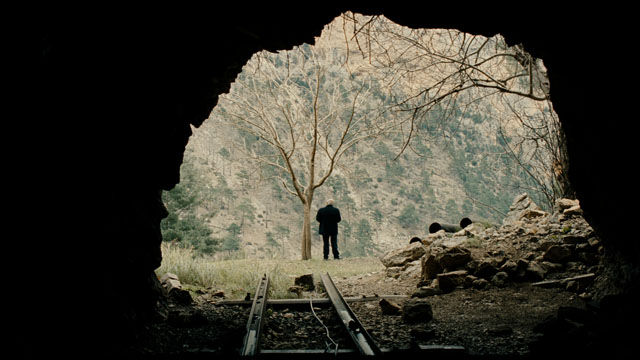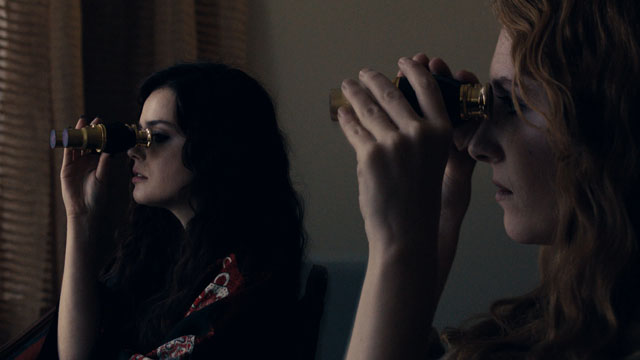“The Venice Film Festival’s independently run Venice Days [August 30 through September 8], modeled on Cannes Directors’ Fortnight, has unveiled its lineup of 10 pics, including nine world preems,” by which, of course, Variety‘s Nick Vivarelli means “world premieres.” The announcement follows yesterday’s from the 27th Venice International Film Critics’ Week (August 29 through September 8), the other independent section whose very name echoes that of its distant cousin at Cannes.
Each program’s featuring the debut of a film by a Cassavetes; it’ll be Zoe for Days and Xan for the Week (and, not to presume you don’t already know, but yes, they’re sisters, both of them daughters of Gena Rowlands and John Cassavetes).
VENICE DAYS
The Lineup:
Hiam Abbas’s directorial debut, Inheritance, “which features an all-star Arab cast including Hafsia Herzi (The Secret of the Grain) and Abbas,” adds Vivarelli. The official synopsis: “A Palestinian family living in the north of Galilee gathers to celebrate the wedding of one of their daughters, as war rages between Israel and Lebanon. Internal conflicts explode between the family—secrets are revealed and lies are unmasked. The battles between different family members become as merciless as the outside war once their father falls into a coma and inches toward death.”
Sólveig Anspach’s Queen of Montreuil. “It’s early summer and Agathe is back in France, at home in Montreuil. She has to get over her husband’s death and return to her work as a film director. The unexpected arrival at her house of a couple of Icelanders, a sea lion and a neighbor that she has always desired yet never vanquished will give Agathe the strength to get her life back on track.”
Rusudan Chkonia’s Keep Smiling. “Geòrgia, Tbilisi, 2010… Mother’s beauty contest… Winner will get an apartment and $25,000… Ten mothers, with seven of them belonging to thè poorest population layer, will desperately try to win…”
Jesper Ganslandt’s Blondie. “Three sisters, all adrift and in crisis, reunite at their childhood home as their domineering mother arranges a big birthday. But the festivities soon come to an end, repressed conflicts rise to the surface. Old wounds are opened and a new family is born.” The trailer:
Jeon Kyu-hwan’s The Weight. “Jung is the mortician at the morgue who has to heavily rely on medicine for his severe tuberculosis and arthritis. Despite his illness, cleansing and dressing the dead is a noble and even beautiful work to him. His life at the morgue is both a reality and a fantasy while the corpses are his models and friends for his paintings, his sole living pleasure….”
Amir Manor’s Epilogue. “Hayuta and Beri, an elderly couple, find it hard to adjust to today’s Israel and to the social changes surrounding them. After years of struggle, the two refuse to let go of their communal dreams, and of their revolutionary plans to build a welfare state in Israel. During a night of painful disillusionment, the two decide to leave their apartment for a last journey.”
Vincenzo Marra’s Il Gemello. No synopsis for this one yet.
Stefano Mordini’s Acciaio (Steel), a teen romance without an official synopsis as yet.
Sarah Polley’s Stories We Tell, an “investigation into the elusive truth buried in the contradictions of a family of storytellers paints a playful and profound portrait of a complicated, deeply loving family.”
Marc-Henri Wajnberg’s Kinshasa Kids. “Kinshasa, Congo. About 30,000 children are accused of witchcraft and expelled from home. Living on the street, little José and his fellow friends—all considered as witch children—decide to form a music band to ward off bad luck along with a crazy impresario called Bebson. Together they will rock Kinshasa!”
Special Events:
Giada Colagrande’s Bob Wilson’s Life and Death of Marina Abramovic. The trailer:
Costanza Quatriglio’s Terramatta: Il Novecento Italiano di Vincenzo Rabito Analfabeta Siciliano. No synopsis.
Marco Segato’s L’uomo che amava il cinema. No synopsis.
Filippo Vendemmiati’s Non mi avete convinto. No synopsis.
Venice Nights:
Alessandra Cardone’s My Friend Johnny. That would be Depp.
Agostino Ferrente and Giovanni Piperno’s Le Cose Belle.
Masbedo’s Tralala.
Enrico Masi’s The Golden Temple.
Andrea Parena’s Nozze D’Agosto.
Stefano Pistolini’s Francesco de Gregori: Finestre Rotte.
Alessandro Scillitani’s Il Risveglio del Fiume Segreto: In Viaggio sul Po con Paolo Rumiz.
Women’s Tales, a series of shorts:
Zoe Cassavetes’s The Powder Room. Watch it here.
Lucrecia Martel’s Muta. The full short is here; teaser:
Giada Colagrande’s The Woman Dress. Watch.
Massy Tadjedin’s It’s Getting Late.
Maya Deren and Alexander Hammid‘s classic of the avant-garde, Meshes of the Afternoon (1943).
Cinema Corsaro:
Giovanni Cioni’s The Intrepids. “Real Pirates and false actors, boys writing lyrics for rap songs, girls writing letters to David Bowie. Men escaping from… reality shows. Fables getting true like the one about Wild Cannibals hanging around the Lake of Bilancino… An experimental film inspired to the life of Emilio Salgari and his novel Yolanda, daughter of the Black Corsair. The movie is part of a series produced by Quarto Film on the 150th anniversary of Salgari’s birth.”
Tonino de Bernardi’s Jolanda tra Bimba e Corsara. Part of the same series of experimental films. “Adventure of children and adults, fancied trips and everyday tragedies. The city and the countryside. Real and dreamt life.”
Alessio di Zio’s Roberto Pellegrinaggio. “Roberto is an idealistic boy, looking for nature more than social relationships…”
Giovanni Maderna and Mauro Santini’s Carmela, Saved by the Buccaneers. Part of the Salgari series. “Carmaux and Wan Stiller, Mimmo and Sussò fishermen from the Old Town, are looking for the Lady of Ventimiglia, here Carmela.”
Vivarelli: “Venice Days will also screen the three finalists for the European Parliament’s Lux prize, which finances subtitles in 23 European languages and EU-wide distribution. They are Hungarian auteur Bence Fliegauf’s gritty Just the Wind, Italian helmer Andrea Segre’s lyrical Shun Li and the Poet and Portuguese helmer Miguel Gomes’s black-and-white Tabu.”
VENICE INTERNATIONAL FILM CRITICS’ WEEK
Opening Film:
Water, “a collective work that is directed and played by directors and actors of both Israeli and Palestinian origins,” according to the Week’s press release. “The film presents seven shorts on the theme of water, not only intended in its symbolic meaning, but also in its practical value, dramatically linked to the conflicts of the area.” The directors are Nir Sa’ar, Maya Sarfaty, Mohammad Fuad, Yona Rozenkier, Mohammad Bakri, Ahmad Bargouthi, Pini Tavger, and Tal Haring.
Competition:
Gabriela Pichler’s Äta sova dö (Eat Sleep Die). “Apparently, the economic crisis hit Sweden too. After being fired, the protagonist keeps on fighting without losing hope, coping with classes for the unemployed (the social safety valves are taken very seriously in Scandinavia) and actual difficulties in finding a new job. This film depicts the extraordinary portrait of a woman, and its cinematic value goes well beyond its realistic narrative.”
Luigi Lo Cascio’s debut feature, La città ideale (The Ideal City), “a strong parable on contemporary Italy. It draws on a certain tradition of committed cinema, and then it becomes an ethical noir, following the story of an obsessively stubborn environmentalist (played by Lo Cascio himself) who is suddenly forced to question his ethical certainties.”
Ali Aydın’s Küf (Mold) “presents strong social and political issues with a stylistic elegance that is typical of the recent tradition of Turkish cinema. This intense work narrates the story of an old railroad watchman living a in village in the countryside. He is waiting for news about his son, who disappeared 18 years before during some protests in Istanbul.”
Paul Negoescu’s O luna in Thailandia (A Month in Thailand) “consciously draws on the sentimental tradition of French cinema, but behind its seeming simplicity and the perfect circularity of its mise-en-scene, one can find the bewilderment of an entire generation. The film’s characters nostalgically look at the past, while contradictorily striving for that modernity that the recent inclusion in the European Union has brought about.”
Natalia Beristain’s No Quiero Dormir Sola (She Doesn’t Want to Sleep Alone), “the story of two women, Amanda (the granddaughter) and Dolores (the grandmother), in a crucial phase of their lives. This film focuses on their bodies and their solitudes, and explores the old age and the theme of euthanasia from an intense and stylistically-rigorous perspective.”
Tom Heene’s Welcome Home “presents a woman facing the consequences of independence as well as those of her sentimental and sexual choices. Within the symbolic setting of Bruxelles, the European city par excellence, three encounters and three men mark the life of Lila, who metaphorically represents the quest for identity of a whole continent.”
Liu Shu’s debut feature, Xiao He (Lotus), in which “a young teacher decides to leave her work to let out her independent spirit and progressive ideas. Moving to Beijing, she realises that she can choose between two opposite paths: submission to the prevailing culture and economy, or the way of dissent.”
Closing Film:
Xan Cassavetes’s Kiss of the Damned, “the fascinating and highly-erotic tale of two vampire sisters living in Connecticut. One wants to give in her blood lust and fulfil her dream of love; the other one is determined to spread her ravenous desire of death. In her debut, this cinephile director pays homage to all sorts of genre cinema, especially the tradition of Italian fantastic film, mixing underground and video art, comics and video clip aesthetics.”
For news and tips throughout the day every day, follow @KeyframeDaily on Twitter and/or the RSS feed. Get Keyframe Daily in your inbox by signing in at fandor.com/daily.







